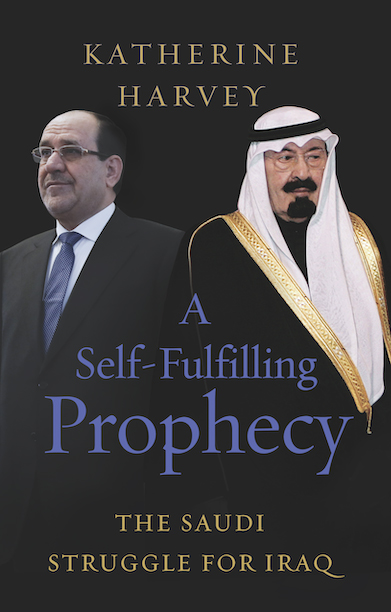Alumni Author Book Talk: Katherine Harvey, SAIS '11 with Bill Kirst, A&S '00

Join alumni Katherine “Kitty” Harvey, SAIS, ‘11 for a discussion of her investigative and thought provoking book A Self-Fulfilling Prophecy: The Saudi Struggle for Iraq (Oxford University Press, 2022) describing how Saudi efforts to undermine Iranian influence paradoxically pushed Iraq into the Islamic Republic’s arms. This book talk and Q&A will be moderated by fellow alum, Bill Kirst, A&S ‘00, Change & Enablement Leader @ Microsoft, Storyteller, and Podcast Host of "Coffee & Change."
"A major contribution to the literature regarding Saudi Arabia’s relations with Iraq in the period following the 2003 U.S. invasion. Deploying multiple tools of social science, Harvey meticulously explores the mindset of Saudi King Abdullah toward Iraqi Prime Minister Nouri al-Maliki." — Robert W. Jordan, former U.S. ambassador to Saudi Arabia
To purchase Harvey's book or for more information, visit Hurst Publishing, Amazon, or other book sellers.
A zoom link will be sent to all registrants prior to the webinar.

About this Book
In recent years, the geopolitical rivalry between Saudi Arabia and Iran has dominated the headlines. Many have charted the polarization between a Saudi-led Sunni camp and an Iranian-led Shia one, assuming that a predominantly Shia state like Iraq would automatically ally with Iran. In this compelling account, Katherine Harvey tells a different story: Iraq’s alignment with Iran was not a foregone conclusion. Rather, Saudi efforts to undermine Iran have paradoxically empowered it.
Harvey investigates why the Saudis refused to engage with Iraq’s post-2003 Shia-led government, despite continual outreach by Iraq’s new leaders and considerable pressure from the United States. She finds that certain deeply ingrained assumptions predisposed Saudi leaders to see a Shia-led Iraq as naturally beholden to Iran: the view that Iran is inherently expansionist, and the belief that Arab Shia tend to be loyal to it. This outlook was simplistic, even downright inaccurate; and, in refusing to engage, the Saudis created a self-fulfilling prophecy.
As Harvey demonstrates, members of Iraq’s new government initially sought to establish a positive relationship with Saudi Arabia, and to pursue a course independent from Iran. But, isolated and rejected by Saudi King Abdullah, Iraq ultimately had nowhere else to turn.
______________________________________
Disclaimer: The perspectives and opinions expressed by the speaker(s) during this program are those of the speaker(s) and not, necessarily, those of Johns Hopkins University and the scheduling of any speaker at an alumni event or program does not constitute the University’s endorsement of the speaker’s perspectives and opinions.
